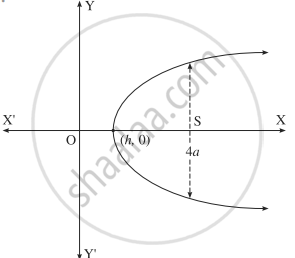Advertisements
Advertisements
Question
Form the differential equation of all parabolas whose axis is the X-axis.
Solution

The equation of the parbola whose axis is the X-axis is y2 = 4a(x - h), ....(1)
where a and h are arbitrary constants.
Differentiating (1) w.r.t. x, we get
`"2y"("dy"/"dx") = 4"a"(1 - 0)`
∴ y`"dy"/"dx" = "2a"`
Differentiating again w.r.t. x, we get
`"y" * "d"/"dx"("dy"/"dx") + "dy"/"dx" * "dy"/"dx" = 0`
∴ `"y"("d"^2"y")/"dx"^2 + ("dy"/"dx")^2 = 0`
This is the required D.E.
APPEARS IN
RELATED QUESTIONS
Obtain the differential equation by eliminating the arbitrary constants from the following equation:
Ax2 + By2 = 1
Obtain the differential equation by eliminating the arbitrary constants from the following equation:
y = A cos (log x) + B sin (log x)
In the following example verify that the given expression is a solution of the corresponding differential equation:
y = `(sin^-1 "x")^2 + "c"; (1 - "x"^2) ("d"^2"y")/"dx"^2 - "x" "dy"/"dx" = 2`
In the following example verify that the given expression is a solution of the corresponding differential equation:
y = `"e"^"ax"; "x" "dy"/"dx" = "y" log "y"`
Solve the following differential equation:
`"dy"/"dx" = (1 + "y")^2/(1 + "x")^2`
Solve the following differential equation:
`log ("dy"/"dx") = 2"x" + 3"y"`
Solve the following differential equation:
`"sec"^2 "x" * "tan y" "dx" + "sec"^2 "y" * "tan x" "dy" = 0`
Solve the following differential equation:
cos x . cos y dy − sin x . sin y dx = 0
For the following differential equation find the particular solution satisfying the given condition:
`(e^y + 1) cos x + e^y sin x. dy/dx = 0, "when" x = pi/6,` y = 0
Reduce the following differential equation to the variable separable form and hence solve:
`"dy"/"dx" = cos("x + y")`
Reduce the following differential equation to the variable separable form and hence solve:
`("x - y")^2 "dy"/"dx" = "a"^2`
Reduce the following differential equation to the variable separable form and hence solve:
`"x + y""dy"/"dx" = sec("x"^2 + "y"^2)`
Reduce the following differential equation to the variable separable form and hence solve:
(2x - 2y + 3)dx - (x - y + 1)dy = 0, when x = 0, y = 1.
Choose the correct option from the given alternatives:
The solution of `("x + y")^2 "dy"/"dx" = 1` is
Choose the correct option from the given alternatives:
The solution of `"dy"/"dx" = ("y" + sqrt("x"^2 - "y"^2))/"x"` is
Choose the correct option from the given alternatives:
The solution of `"dy"/"dx" + "y" = cos "x" - sin "x"`
The integrating factor of linear differential equation `x dy/dx + 2y = x^2 log x` is ______.
Choose the correct option from the given alternatives:
The solution of the differential equation `"dy"/"dx" = sec "x" - "y" tan "x"`
The particular solution of `dy/dx = xe^(y - x)`, when x = y = 0 is ______.
In the following example verify that the given function is a solution of the differential equation.
`"x"^2 = "2y"^2 log "y", "x"^2 + "y"^2 = "xy" "dx"/"dy"`
Solve the following differential equation:
`"dy"/"dx" = "x"^2"y" + "y"`
Find the particular solution of the following differential equation:
`2e ^(x/y) dx + (y - 2xe^(x/y)) dy = 0," When" y (0) = 1`
Select and write the correct alternative from the given option for the question
Solution of the equation `x ("d"y)/("d"x)` = y log y is
The general solution of `(dy)/(dx)` = e−x is ______.
Select and write the correct alternative from the given option for the question
General solution of `y - x ("d"y)/("d"x)` = 0 is
Select and write the correct alternative from the given option for the question
The solutiion of `("d"y)/("d"x) + x^2/y^2` = 0 is
Form the differential equation of family of standard circle
Find the differential equation by eliminating arbitrary constants from the relation x2 + y2 = 2ax
Find the differential equation by eliminating arbitrary constants from the relation y = (c1 + c2x)ex
Verify y = log x + c is the solution of differential equation `x ("d"^2y)/("d"x^2) + ("d"y)/("d"x)` = 0
Form the differential equation of all straight lines touching the circle x2 + y2 = r2
Choose the correct alternative:
The slope at any point of a curve y = f(x) is given by `("d"y)/("d"x) - 3x^2` and it passes through (-1, 1). Then the equation of the curve is
If `x^2 y^2 = sin^-1 sqrt(x^2 + y^2) + cos^-1 sqrt(x^2 + y^2)`, then `"dy"/"dx"` = ?
If y = (tan–1 x)2 then `(x^2 + 1)^2 (d^2y)/(dx^2) + 2x(x^2 + 1) (dy)/(dx)` = ______.
The differential equation of the family of circles touching Y-axis at the origin is ______.
Form the differential equation whose general solution is y = a cos 2x + b sin 2x.
Find the particular solution of the differential equation `x^2 dy/dx + y^2 = xy dy/dx`, if y = 1 when x = 1.
Solve the differential equation
ex tan y dx + (1 + ex) sec2 y dy = 0
